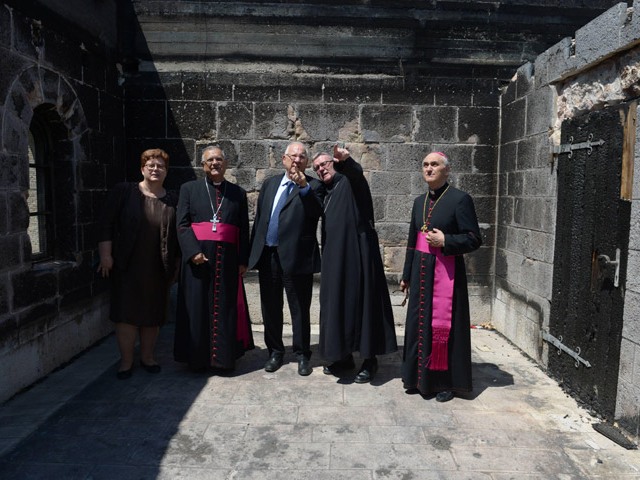President Rivlin visits Tabgha and Christian site
-
-
8/27/2015
-
-

 President Rivlin visits the Church of the Multiplication of the Loaves and Fishes in Tabgha
copyright: GPO/Mark Neiman
President Rivlin visits the Church of the Multiplication of the Loaves and Fishes in Tabgha
copyright: GPO/Mark Neiman
|
GovXContentSection
(Communicated by the President's Spokesperson) President Reuven Rivlin this morning (Thursday,) visited Christian sites in the Jordan Valley, and met with Church and community leaders, ahead of his upcoming visit to Italy and the Vatican next week. As part of the visit, the President also visited Tabgha, and the Church of the Multiplication of the Loaves and Fishes on the banks of the Sea of Galilee. In June, the church suffered an arson attack which caused serious damage. At Tabgha, the President was met by the Apostolic Nuncio to Israel, Msgr. Giuseppe Lazzarotto; the abbot responsible for the site, Father Gregory Collins, head of the Order of Saint Benedict in Israel; and German Charge D'Affairs Monika Iwersen. The President surveyed the damage at the site caused by the arson and graffiti attack, and heard from Director of the Jerusalem office of the German Association of the Holy Land, Mr. Bernd Mussinghoff, of the plans to restore the site. In the President's meeting with the Church leaders, Father Collins warmly thanked the President for his support in the aftermath of the attack, and praised the police and security services for their swift and dedicated work, which had enabled the arrest of the suspects who were to face trial. The President said, "It is an honor to be here as your guest. The warm welcome you have shown me, in this beautiful place, is a sign of the close friendship between the Jewish and Christian communities in the Holy Land, and around the world. I am here today, to make clear that the State of Israel - as a Jewish and democratic state, democratic and Jewish - holds dear its responsibility to protect, the freedom and safety of all faiths in Israel. We are here to make clear, there is no religious war in the holy land, these are attacks by fundamentalists, against a whole society, these are attacks by people who seek war and destruction, against people who seek to live in peace." He added, "Israel will work to ensure that all those of faith, are able to flourish in the State of Israel, which will enable us to bridge any divide." Earlier, the President visited Christian sites in the Jordan Valley including Eretz HaMinzarim or "land of the Monasteries", which is the area formed around the baptism site on the Jordan River where, according to Christian tradition, Jesus was baptized by John the Baptist. The site's importance is both religious and historical. Over the years, monasteries and guest houses were built along the western banks of the Jordan River for pilgrims who came to the site to be baptized. During the Ottoman period the monasteries were gradually abandoned until the British Mandate, when tourism resumed around Jericho and the baptism site, and new monasteries were built. Following an earthquake in 1956 and the Six Day War in 1967, the churches were abandoned by their inhabitants, the border stretched to the west perimeter of the site, and mines were places between the site and the river. A road extended from the site area and to the south of it linking a number of major landmarks, churches, chapels and monasteries. These have given the region its name - "land of the Monasteries". Recently, a new development project was initiated in cooperation with the IDF and the Nature Reserves Authority in order to develop the area and open it up to travelers and tourists. During his visit to the sites, the President was accompanied by Maj. Gen. Yoav Mordechai and Brg. Gen. Nadav Padan. Maj. Gen. Mordechai of COGAT, spoke to the President at the Qasr el-Yahud baptism site, and stressed the importance of the cooperation with the Christian community. He said, "We suggested this initiative to the church and Christian community heads, who we are pleased joined together with us in the project. We all understand the historical importance of the area, and the importance of preserving the sites." The President heard of the important progress the project had made, including the removal - at a cost of millions of shekels - of mines laid during the 1970s, and the rebuilding of infrastructure and buildings. The President also saw the legal and security implications of project, and the complexities of working in the area. Civil Administration representatives also updated the President that the Christian community leaders had warmly welcomed the project, including the Greek Orthodox Patriarch who had given his blessing to the initiative. Brg. Gen. Nadav Padan spoke with the President about the close cooperation with the Jordanian side, especially on the removal of land mines which was being undertaken. Also during his visit, President Rivlin laid a wreath at the graves of members of the old Kibbutz Beit HaArava which fell in the war of 1948.
-
-
-
-
-
-
-
-
-
-
-
-
-
-
-
-
-
-
-